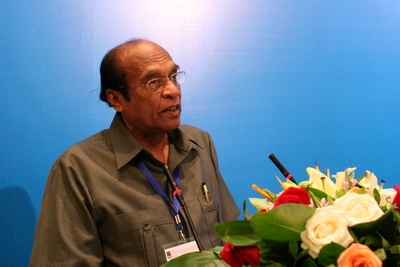
Subject: Strengthening International Co-operation to facilitate the Recovery
of World Economy
Dear members of the Presidium
Distinguished Participants!
At the outset, permit me, on behalf of the Sri Lankan delegation to express our deep appreciation and extend our profound thanks to the Hosts for their kind invitation and generous hospitality.
The subject, under discussion is timely, relevant and important.
As you are aware, Sri Lanka is a small player in the global economy. Though it has a fairly impressive social development record, with a G.D.P. growth rate of 6 - 7% in the last 3 years, with a higher per capita Income, it faced daunting challenges in its march towards socio-economic progress on account of an on-going internal arms-conflict and external factors of its economy.
Sri Lanka, being a country highly trade-dependant accounting for about 70% of its G.D.P. was vulnerable to the vicissitudes of the world economy.
The current global financial crisis hit us badly at a critical moment when the armed conflict was at its height. In the fourth quarter of 2008, the external sector of our economy was affected by the global financial crisis, as a result of:
I. Sudden withdrawal of investments in Treasury Bills and Bonds by foreign investors.
II. Hasty claims on short-term credit.
III. Sharp drying-up of commercial financing.
IV. Valuation losses arising from the sharp depreciation of major international currencies against U.S. Dollar.
As a result, the Balance of Payment turned into a Deficit and Reserves dropped sharply (the highest level U.S. $ 3.5 million in July, 2008 and the lowest level U.S. $ 1.2 million in March, 2009).
However, due to our prudent and flexible financial and monetary policies, we were able to safeguard our economy and its financial system.
We were also able to withstand the pressures imposed on it by virtue of its economic strategy aimed at, increased domestic production, development of rural economy, regional development, infrastructure, and small and medium enterprises.
Global economic recovery is of special importance to a small developing country such as Sri Lanka in the context of our need to enhance our exports, tourist industry, greater inflow of foreign capital, bi-lateral and multi-lateral assistance and sustenance of remittances from employment abroad.
This global financial crisis that has engulfed nations across the world has brought renewed focus on the oligarchy of multi-national financial institutions. The finance industry has created instruments such as derivatives, hedge-funds, futures etc. as a means of managing risks, with the sole objective of maximizing their profits, without caring for the negative consequences.
The Banks too resorted to the use of financial instruments such as securitization. This led to the collapse of the world's largest financial institutions wiping out about 33% of the value of world's companies in the current financial melt-down.
As a result,
1. The U.N. Millennium Development Goals are affected.
2. Developing countries are crippled by huge debt burdens.
3. Resources meant for relief have been diverted to bail-outs in the developed countries.
4. Donor organizations are dried up.
This situation has brought out a hot debate on the" free markets".
After the oil shock of 1970s, the regulated markets were abandoned in order to pave way for neo-liberalism which was in force in the last 3 decades.
The authors of "free markets" went so far as to prescribe to the democratic governments to abandon their role completely in the affairs of the economy.
Only those countries who did not fully liberalize their capital and financial markets have been spared the major brunt of the present crisis.
Wiser counsel should prevail now in order to ensure recovery, rebuild confidence and bring growth back into the system. There is growing consensus for regulatory reforms in the international banking and financial system in order to prevent risk, more so excessive risks. Absence of transparency and accountability too has been recognized as among the major causes of systemic failures.
More voice and power should be given to the emerging countries and poorer countries. The demand for reforms in U.N., I.M.F. World Bank, and W.T.O. is back on the agenda and needs highest priority.
Emergence of G 20 in place of G 7 was a recognition of that reality.
The Quota and Vote at the I.M.F. needs readjustment. The South Asia as a whole accounts for only 2.8% of the total votes at the I.M.F. while Belgium with a population of only 8 million has a vote of 2.1%.
The question of international reserve currency, in the context of the world's new economic realities, needs to be reconsidered. It is our acceptance that no national currency should be given the unique privilege of enjoying the status of international reserve currency.
The world is moving from unipolarity to multi-polarity, expressed as follows:
1. Emergence of several economic centres in the world economy as expressed through G 20.
2. G.D.P. of Six Asian economies amounts to $ 17 trillion (of the world's G.D.P. of $ 60 trillion) providing evidence in support of Asia, as the World's Economic Centre in the 21st. century.
3. Sources of funds now concentrated in Asia (including Middle East).
4. Formation of new economic blocs, alliances and organizations.
5. Key sources of energy in Euro-Asia region.
6. The Asian countries are moving out of the recession faster than developed countries.
7. Awakening Latin America, moving away from neo-liberalism enbloc.
The need for a new world economic order is strongly felt now, more than ever and the need for a new architecture of the international financial system is imperative. Reality dictates this need.
Thanks.